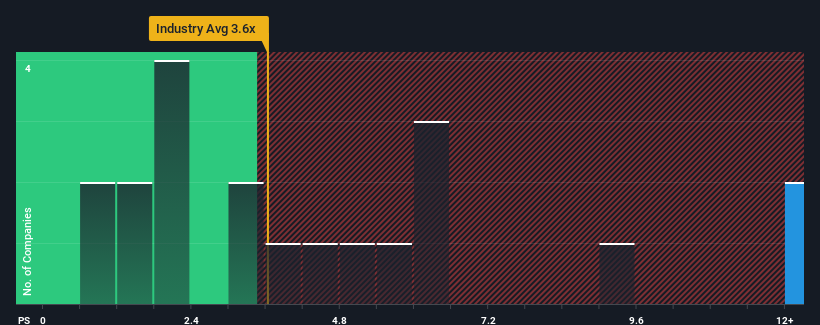- Saudi Arabia
- /
- Food
- /
- SASE:6050
Saudi Fisheries Company's (TADAWUL:6050) Share Price Matching Investor Opinion

Saudi Fisheries Company's (TADAWUL:6050) price-to-sales (or "P/S") ratio of 21.4x may look like a poor investment opportunity when you consider close to half the companies in the Food industry in Saudi Arabia have P/S ratios below 3.6x. However, the P/S might be quite high for a reason and it requires further investigation to determine if it's justified.
Check out our latest analysis for Saudi Fisheries

What Does Saudi Fisheries' P/S Mean For Shareholders?
It looks like revenue growth has deserted Saudi Fisheries recently, which is not something to boast about. One possibility is that the P/S is high because investors think the benign revenue growth will improve to outperform the broader industry in the near future. If not, then existing shareholders may be a little nervous about the viability of the share price.
We don't have analyst forecasts, but you can see how recent trends are setting up the company for the future by checking out our free report on Saudi Fisheries' earnings, revenue and cash flow.What Are Revenue Growth Metrics Telling Us About The High P/S?
Saudi Fisheries' P/S ratio would be typical for a company that's expected to deliver very strong growth, and importantly, perform much better than the industry.
If we review the last year of revenue, the company posted a result that saw barely any deviation from a year ago. However, a few strong years before that means that it was still able to grow revenue by an impressive 33% in total over the last three years. Accordingly, shareholders will be pleased, but also have some questions to ponder about the last 12 months.
Comparing that recent medium-term revenue trajectory with the industry's one-year growth forecast of 6.9% shows it's noticeably more attractive.
With this in consideration, it's not hard to understand why Saudi Fisheries' P/S is high relative to its industry peers. It seems most investors are expecting this strong growth to continue and are willing to pay more for the stock.
The Final Word
While the price-to-sales ratio shouldn't be the defining factor in whether you buy a stock or not, it's quite a capable barometer of revenue expectations.
It's no surprise that Saudi Fisheries can support its high P/S given the strong revenue growth its experienced over the last three-year is superior to the current industry outlook. In the eyes of shareholders, the probability of a continued growth trajectory is great enough to prevent the P/S from pulling back. If recent medium-term revenue trends continue, it's hard to see the share price falling strongly in the near future under these circumstances.
You always need to take note of risks, for example - Saudi Fisheries has 2 warning signs we think you should be aware of.
Of course, profitable companies with a history of great earnings growth are generally safer bets. So you may wish to see this free collection of other companies that have reasonable P/E ratios and have grown earnings strongly.
New: Manage All Your Stock Portfolios in One Place
We've created the ultimate portfolio companion for stock investors, and it's free.
• Connect an unlimited number of Portfolios and see your total in one currency
• Be alerted to new Warning Signs or Risks via email or mobile
• Track the Fair Value of your stocks
Have feedback on this article? Concerned about the content? Get in touch with us directly. Alternatively, email editorial-team (at) simplywallst.com.
This article by Simply Wall St is general in nature. We provide commentary based on historical data and analyst forecasts only using an unbiased methodology and our articles are not intended to be financial advice. It does not constitute a recommendation to buy or sell any stock, and does not take account of your objectives, or your financial situation. We aim to bring you long-term focused analysis driven by fundamental data. Note that our analysis may not factor in the latest price-sensitive company announcements or qualitative material. Simply Wall St has no position in any stocks mentioned.
About SASE:6050
Saudi Fisheries
Engages in fishing, fish-farming, and other activities in the Kingdom of Saudi Arabia.
Excellent balance sheet low.
Market Insights
Community Narratives




